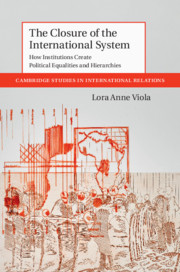 The Closure of the International System
The Closure of the International System Social Closure, Club Dynamics, and Stratification in the International System
Published online by Cambridge University Press: 16 June 2020
This chapter develops the closure thesis—a theoretical framework for understanding the inter-related dynamics of political equality and inequality in the international system based on joining the neo-Weberian concept of social closure and the economic idea of club goods. The closure thesis consists of a constitutive and a causal logic that together contribute an explanation for the reproduction and transformation of political inequalities, understood as the distribution of participatory and procedural rights. The closure thesis makes a constitutive and a causal argument: first, that institutions create rules of closure that over time have narrowed—rather than expanded—the type of political actors considered legitimate participants, thereby constituting members as categorical equals and non-members as categorical unequals; second, that as institutions respond to normative or functional pressures to be include more, and more diverse, states, incumbents face strong incentives to respond by protecting their privileges through institutional designs—such as assimilative multilateralism, hierarchical multilateralism, and exclusive multilateralism—that distribute procedural rights unequally. The closure thesis thus contests the view that the globalization of the international system has been a process of greater inclusiveness of formerly marginalized actors accompanied by a more egalitarian and even democratic multilateral institutional order.
To save this book to your Kindle, first ensure [email protected] is added to your Approved Personal Document E-mail List under your Personal Document Settings on the Manage Your Content and Devices page of your Amazon account. Then enter the ‘name’ part of your Kindle email address below. Find out more about saving to your Kindle.
Note you can select to save to either the @free.kindle.com or @kindle.com variations. ‘@free.kindle.com’ emails are free but can only be saved to your device when it is connected to wi-fi. ‘@kindle.com’ emails can be delivered even when you are not connected to wi-fi, but note that service fees apply.
Find out more about the Kindle Personal Document Service.
To save content items to your account, please confirm that you agree to abide by our usage policies. If this is the first time you use this feature, you will be asked to authorise Cambridge Core to connect with your account. Find out more about saving content to Dropbox.
To save content items to your account, please confirm that you agree to abide by our usage policies. If this is the first time you use this feature, you will be asked to authorise Cambridge Core to connect with your account. Find out more about saving content to Google Drive.